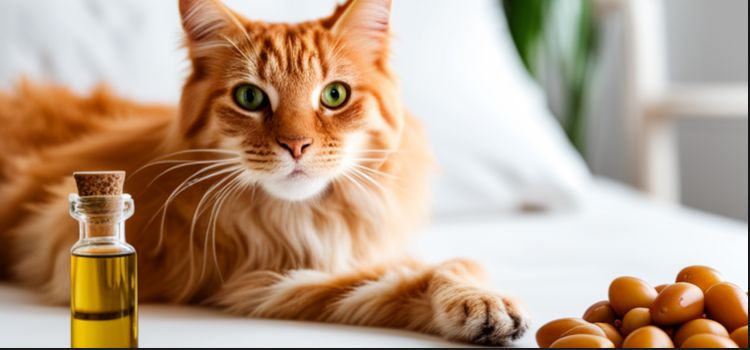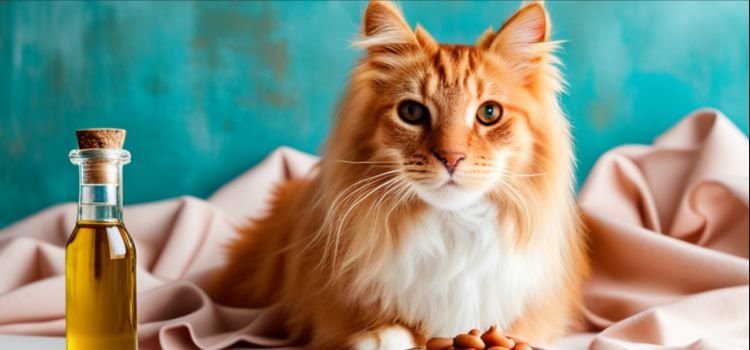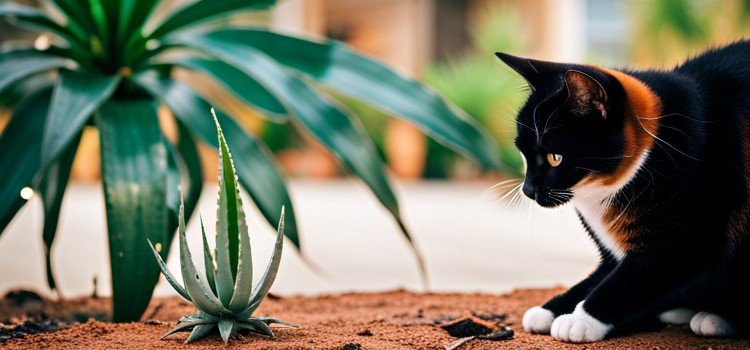As an Amazon Associate committed to the mission of improving the lives of our readers, Live-Clear.com receives a small commission from eligible purchases made through our affiliate links. This revenue enables us to keep producing insightful articles and other material.
Argan oil, often called “liquid gold,” has gained popularity recently for its numerous health and beauty benefits. Derived from the kernels of the argan tree, this natural oil is known for its moisturizing and nourishing properties. Many people use argan oil for their hair, skin, and nails. But what about our furry friends? Can cats benefit from argan oil, and more importantly, is argan oil safe for cats?

In this comprehensive guide, we will explore the world of argan oil and its potential benefits and risks for feline companions. We’ll provide a detailed breakdown of argan oil, its components, and how they might affect cats. Furthermore, we’ll answer frequently asked questions and provide practical advice for using argan oil with cats.
Understanding Argan Oil
What is Argan Oil?
The kernels of the argan tree, also known as Argania spinosa in its scientific form, are the source of the natural oil known as argan oil. This tree is native to Morocco and is often called the “Tree of Life” due to its various uses and importance in the region. The oil is rich in essential fatty acids, antioxidants, and various vitamins, making it a popular choice for cosmetic and culinary purposes.
Composition of Argan Oil
Argan oil is primarily composed of:
- Fatty Acids: These include oleic acid, linoleic acid, and palmitic acid, which contribute to the oil’s moisturizing and nourishing properties.
- Antioxidants: Argan oil is packed with vitamin E and other antioxidants, which can help protect the skin and hair from damage caused by free radicals.
- Sterols: Sterols promote skin healing and offer anti-inflammatory benefits.
- Polyphenols: These compounds can help protect against the effects of aging and UV radiation.
Health and Beauty Benefits for Humans
Argan oil is widely praised for its positive effects on human health and beauty, such as:
- Moisturizing and softening the skin.
- There is a visible diminishment in the appearance of fine lines and wrinkles.
- Strengthening and nourishing hair and nails.
- Providing relief from dry skin conditions.
- Acting as a natural anti-inflammatory.
Can Cats Benefit from Argan Oil?
Potential Benefits for Cats
While argan oil is often associated with human use, there are potential benefits for cats as well. These may include:
Skin and Coat Health
Argan oil’s moisturizing properties can benefit cats with dry or flaky skin. It may help relieve itchiness and promote a healthy, shiny coat. The oil can penetrate the skin, providing hydration and nourishment to the epidermis and hair follicles. Additionally, argan oil contains essential fatty acids that can help improve the overall health of a cat’s skin and coat. These fatty acids can help reduce inflammation and promote a robust and resilient coat. Regular use of argan oil may also help prevent common skin issues such as dandruff or excessive shedding in cats.
Fur Shine and Softness
Like humans, argan oil can contribute to a cat’s fur looking soft and shiny. This can be particularly helpful for long-haired breeds prone to matting and tangles. Regular use of argan oil on a cat’s fur can help prevent matting and tangles, making grooming more accessible and comfortable. Additionally, the oil’s moisturizing properties can help reduce static electricity in the fur, resulting in a smoother and silkier texture.
Is Argan Oil Safe for Cats?
Safety Concerns
Before using argan oil on your cat, it’s essential to understand the potential risks and safety concerns:
- Allergies: Cats can be allergic to various substances, including argan oil. Signs of an allergic reaction may include itching, redness, hives, and, in severe cases, difficulty breathing.
- Ingestion: While topical application of argan oil is generally considered safe, ingestion can be problematic. Cats are meticulous groomers, and if they ingest argan oil, it could lead to digestive issues, including diarrhea and vomiting.
Risks and Allergies
Before applying argan oil to your cat’s skin or fur, perform a patch test. Apply a small amount of diluted argan oil to a small area of your cat’s skin and monitor for any adverse reactions for 24-48 hours. If there is no reaction, you should probably feel comfortable using it. However, it is essential to note that some cats may be allergic to argan oil. If you notice any signs of an allergic reaction, such as excessive itching, redness, or swelling, discontinue use immediately and consult a veterinarian for further guidance.
Argan Oil Ingestion
If you plan to use argan oil on your cat, be cautious to prevent them from licking it. You can do this by applying the oil to areas more difficult for your cat to reach with their tongue or using a cat-friendly cone collar to prevent licking. Always store argan oil out of your cat’s reach. Ingestion of argan oil by cats can lead to gastrointestinal upset, such as vomiting or diarrhea. If you suspect your cat has ingested argan oil, it is best to consult with a veterinarian for further guidance and monitoring.
How to Safely Use Argan Oil with Cats
Patch Testing
Perform a patch test on a small area of your cat’s skin to check for adverse reactions. This can be done by applying a small amount of diluted argan oil to a small area and monitoring for any signs of irritation or discomfort. If there is no reaction, it is likely safe to use on your cat’s skin. However, if you notice any redness, swelling, or itching, it is best to avoid using argan oil on your cat altogether.
Choosing the Right Argan Oil
Opt for high-quality, pure argan oil without additives or fragrances. Look for argan oil that is certified organic and safe for human use. Avoid using argan oil specifically formulated for use on humans, as it may contain additional ingredients that could be harmful to cats. Additionally, consult with your veterinarian before using argan oil on your cat to ensure it is safe for their specific needs and health conditions.
Applying Argan Oil
When applying argan oil to your cat, follow these steps:
- Dilute the Oil: Mix argan oil with a carrier oil such as coconut or olive oil to ensure it’s not too concentrated.
- Use a Small Amount: Apply only a tiny amount, rubbing it gently into the fur or skin.
- Avoid Sensitive Areas: Avoid areas your cat can quickly lick, such as the paws or belly.
- Observe: Monitor your cat for any adverse reactions for at least 48 hours.
Monitoring for Allergic Reactions
Watch your cat for allergies or discomfort after applying argan oil. Stop using the product immediately and talk to your veterinarian if you experience any adverse side effects. Allergic reactions can manifest as itching, redness, swelling, or excessive grooming. It is essential to carefully observe your cat’s behavior and any changes in their skin or fur. If any discomfort persists or worsens, seek professional advice from a veterinarian to ensure your cat’s well-being.

Conclusion
In conclusion, argan oil can benefit cats when used cautiously and responsibly. Before using argan oil on your feline friend, consider their specific needs and consult your veterinarian if you have any concerns. When used appropriately, argan oil may contribute to a healthier and shinier coat for your beloved pet.
FAQs about Argan Oil and Cats
It’s best to choose high-quality, pure, and organic argan oil without additives or fragrances. Check to see if it’s fit for human consumption.
It’s best to use argan oil sparingly. First, use a minimal amount, and pay attention to how it affects you. Depending on your cat’s needs, you can use it occasionally.
Argan oil may help alleviate dry skin in cats. However, consult your veterinarian if your cat has a persistent skin issue.
It’s advisable to consult your veterinarian before using any product, including argan oil, on kittens.
If your cat ingests argan oil, monitor them for digestive issues. If they exhibit severe symptoms, contact your veterinarian immediately.
Always prioritize your cat’s safety and well-being, and remember that what works for humans may not always be suitable for our four-legged companions. It’s essential to keep all products, including argan oil, out of reach from your cat to prevent accidental ingestion. Additionally, if you suspect your cat has ingested argan oil or any other harmful substance, it’s best to contact a professional for guidance on how to proceed.
Amazon and the Amazon logo are trademarks of Amazon.com, Inc, or its affiliates.



